Hi everyone! My name is Aidan, and I’m from Washington, New Jersey. I’m looking forward to being a part of this class and smelling the fresh farm air every Friday afternoon.
Here’s a picture of me with not one, but two goats–I was very popular!
For my independent field trip, I went to Shunpike Dairy in Millbrook. Shunpike Dairy is a small dairy farm with a herd of 25 cows. However, unlike a majority of the other dairy farms in the Hudson Valley, including the one that we want to that’s a part of Hudson Valley Fresh, Shunpike Dairy is unique in a particular way: they sell exclusively raw milk. Raw milk can be quite hard to come by, because it’s not legal to sell it in stores. Raw milk hasn’t been pasteurized, and as a result it’s hard to regulate–it could be unsafe to sell in stores because of the pathogens that can occur in unpasteurized milk. However, it is perfectly legal for Farms like Shunpike Dairy to sell raw milk at their own farm.
The way it works at Shunpike is this: you drive up, and park your car just anywhere on the farm. It really looks just like a regular small farm; there’s no storefront or farm store or anything. You walk up to the barn enter a small room next to the barn with a sign on the door that says “raw milk inside.” Inside that room, there’s a spout attached to the large machine that churns the milk; you serve yourself the milk from that spout. They have mason jars in different sizes available for you to take for a small price, or you can bring your own from home.
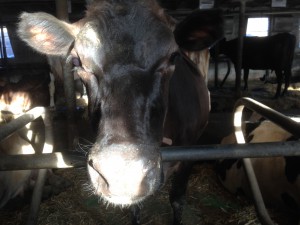
Their sales operate on an honor system; when I went, there was no one there. You add up the prices for the milk you’ve bought and the mason jar you’re taking it home in, if like me you forgot to bring your own, and you leave the correct amount of money in a jar. Shunpike also sells eggs from a nearby chicken farm, and bumper stickers that advocate for raw milk, the sale of which is a pretty politicized issue for many farmers. According to their website, they also often sell raw honey and maple syrup.
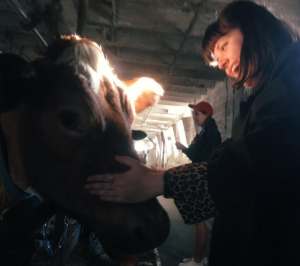
Even though no one was there, the barn was open and I was able to go inside and say hi to the cows! They had a small herd of probably about 30 cows, all of whom were very friendly. Shunpike was definitely the smallest-scale farming operation I’ve been to. They seem to be very integrated with the community, and they’re dedicated to keeping farming alive in the Hudson Valley. Perhaps most importantly, the milk was incredible! Raw milk doesn’t taste drastically different from pasteurized milk, but it just tastes better: it’s incredibly fresh and creamy, and is great in coffee. Overall, I loved the experience of visiting and buying milk from Shunpike and will definitely do it again!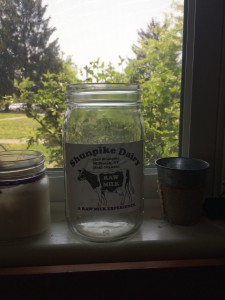
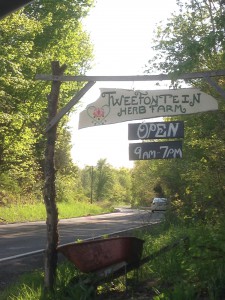 Two weeks ago, my sister, Juliette and I went on a hike in the Catskills. On our way home, as we were heading towards New Paltz, we passed a sign for “Tweefontein Herb Farm.” I had previously known about the other farm stands along the road, and was planning on stopping at one of them for my independent fieldtrip, but I was intrigued by the herb farm and pulled in. Up a narrow dirt road we came across a little house. It looked more like someone’s residence than a farm, except that it was surrounded by herb gardens and had herbs and streamers hanging form the eaves.
Two weeks ago, my sister, Juliette and I went on a hike in the Catskills. On our way home, as we were heading towards New Paltz, we passed a sign for “Tweefontein Herb Farm.” I had previously known about the other farm stands along the road, and was planning on stopping at one of them for my independent fieldtrip, but I was intrigued by the herb farm and pulled in. Up a narrow dirt road we came across a little house. It looked more like someone’s residence than a farm, except that it was surrounded by herb gardens and had herbs and streamers hanging form the eaves.
On the porch, a young man and woman, both barefoot, beckoned us inside. They led us to their small shop, which was filled with herbs and incense. The store also sells crystals, jewelry, hangings, perfumes, and thrifted clothes. Their best seller however is their tea, which they make from their own natural herbs. Originally, one of the women had owned a crystal shop in New Paltz, but she joined forces with the herb farm and they now sell their goods together. Their goods range from $1 items, such as sprigs of herbs or tiny amethysts, to much more expensive items of jewelry or perfume.
The Tweefontein Herb Farm is a much larger operation than I imaged. After speaking with the man and woman we had met on our way in, we learned that the farm sells at all the major farmers markets in New York, including the Union Square farmers market. They say they have a loyal following, especially for their tea. When I asked if they sold much near by, the man explained that they occasionally sell in New Paltz, but that they don’t have much of a community customer base. I wasn’t particularly surprised by this, especially given what we’d learned in class about the pull of New York business and the hidden nature of their little farm.
The farm is all organic and was created from an old homestead, which originally had been a dairy farm. In the 1980s, the Tweefontein Farm became a member of the New York City Greenmarket and has been one ever since. The farm grows herbs and vegetables and makes added value goods, such as tea and herbal medicines.
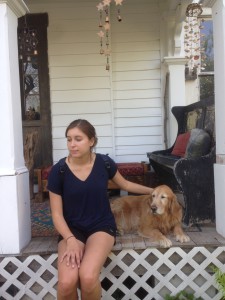 The two young people we met offered to pick us some fresh herbs, since they said that most of their herbs haven’t bloomed yet (it’s not quite the season yet). My sister bought some crystals and we made our way back out into the world. It felt as if we had walked out of a dream, and our clothes still carried the smell of the incense from inside. Outside we petted their two resident golden retrievers and waved goodbye.
The two young people we met offered to pick us some fresh herbs, since they said that most of their herbs haven’t bloomed yet (it’s not quite the season yet). My sister bought some crystals and we made our way back out into the world. It felt as if we had walked out of a dream, and our clothes still carried the smell of the incense from inside. Outside we petted their two resident golden retrievers and waved goodbye.
For my independent exploration of Hudson Valley agriculture, I paid a visit to Wallkill View Farm in New Paltz. It is a family-owned and operated farm with an extensive permanent farm market on-site. They sell fresh produce and flowers grown on the farm, as well as products like jams, soaps, and gardening supplies and seeds. The wide range of offerings draws customers in an area abounding with apple farms.
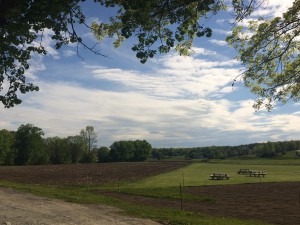
Located in the center of the roughly 200-acre property is the farm market, a group of buildings including the produce market, several large greenhouses full of flowers and vegetable plants for sale, and a bake shop. Standing in the parking lot, you get a view of the brick buildings of New Paltz to the east and of the distinctive formations of the Mohonk Preserve to the west. To the south, invisible to visitors, runs the farm’s namesake stream, the Wallkill.
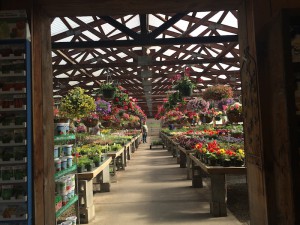
Three generations of the Ferrante family have farmed this land and sold their produce on-site. Founders Peter and Carol have been succeeded in the business by four sons and three grandchildren, although Tim, one of the sons, mentioned that his father still works there.
The open season at Wallkill View stretches from the end of March until Christmas Eve, and they offer varying produce and products during those times. According to their website (check out http://www.wallkillviewfarmmarket.com/), in spring they offer a wide range of annual and perennial flowers and herbs, as well as trees and shrubs. Summer is the right season for fresh fruit and vegetables, including seasonal favorites like sweet corn and berries. In fall they have a pick-your-own pumpkin patch and hayrides, and regional favorites like apple cider and cider doughnuts are available inside. To round out the open season, they sell Christmas trees in December–these they don’t grow on the farm.
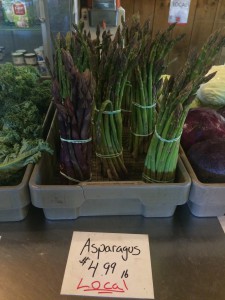
It is currently asparagus season–something of a controversial vegetable, in my experience; people either love or hate it. I asked Tim about vegetable popularity–surely there are some that just don’t sell as well as others? He agreed, of course there are hot-ticket items like corn and tomatoes, which sell very well. On the other hand, he said “You grow some stuff and you can’t give it away.” However, he explained that, as in any business, it’s a learning process to discover which crops work and which don’t with the customer base.
We also talked a bit about the family-farm dynamic. Tim remarked that the reason he stayed in the business was to be with his family, and he’s happy to see that the younger family members are keeping up with the tradition. When asked why he thought the average age of farmers in the US is fairly advanced, and what he thought the challenges facing young farmers were, he suggested, “The biggest problem of starting up is probably the cost–you know, the land, the equipment.” Small farms, though, are likely more manageable, as long as you market well, he remarked. Having a farm in the family is also helpful, since we saw many farmers this semester who have to search for and rent land; the young Ferrantes already have the land to farm, should they want to continue the practice.
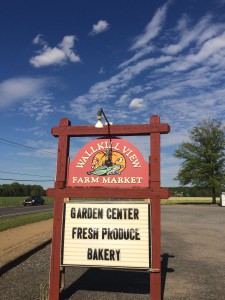 Wallkill View was an interesting contrast to the other farms we visited in class. As a family-owned and family-run business, it differs from some of the other farms whose farmers and owners were not one and the same. Wallkill View also seems a bit more commercial than some of the other farms, offering products and produce from other farms as well as their own. They also were, if my memory serves me, the only farm I saw that relies on its own store instead of taking its produce to market. Overall, it seems like a charming and accessible option for New Paltzers and travelers alike to buy produce and locally-made products.
Wallkill View was an interesting contrast to the other farms we visited in class. As a family-owned and family-run business, it differs from some of the other farms whose farmers and owners were not one and the same. Wallkill View also seems a bit more commercial than some of the other farms, offering products and produce from other farms as well as their own. They also were, if my memory serves me, the only farm I saw that relies on its own store instead of taking its produce to market. Overall, it seems like a charming and accessible option for New Paltzers and travelers alike to buy produce and locally-made products.
New Paltz is a town known for its unique array of shops, proximity to the great outdoors, and the youthful, granolay, nature-loving population it attracts. The Main Course is one culinary hotspot that has placed New Paltz at the vanguard of the Hudson Valley’s local agricultural movement and contributed to the town’s trendy vibe.
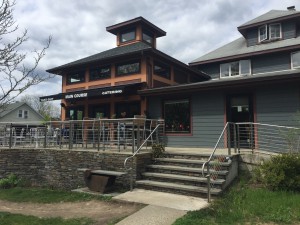
Located at the head of Main Street, Main Course is a farm-to-table restaurant and catering business that was started 26 years ago by chef Bruce Kazan. The menu features an eclectic mix of fresh salads, sandwiches, soups, and entrees that are made with seasonal foods and locally sourced meats. Since its opening, Main Course has been committed to providing customers with quality local ingredients and has sprouted up as a dining hotspot within the New Paltz community.
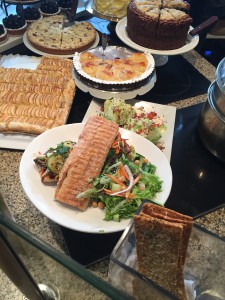
On a spring afternoon, I visited Main Course to get a taste of the Hudson Valley’s fresh produce. After enjoying a delicious eggplant sandwich that combined roasted red peppers, Portobello mushrooms, and mozzarella cheese, I had the opportunity to chat with Hogan, the Assistant Director of Catering. Hogan is a graduate from the Culinary Institute of America and a self-declared foodie, so working for Main Course has been a perfect way of combining his culinary skills and passion for quality food. Hogan emphasized the restaurant’s dedication to sustainability, consistency, and community.
Main Course depends on a number of purveyors that stretch across the valley for its meats and produce, including Sprout Creek Farm in Duchess County, Russell Farms in Rhinebeck, the very local Phillies Bridge Project in New Paltz, and Baldor, a company that distributes local produce throughout the Northeast. While the restaurant does not require purveyors to don the organic label (mostly due to the fact that the term “organic” has become a liberally used buzzword that is no longer indicative of quality or freshness), they do ensure that each vendor has high standards in terms of animal welfare, low environmental impact, and sustainability. Hogan made it clear that The Main Course only uses food that is local and “sourced responsibly.”
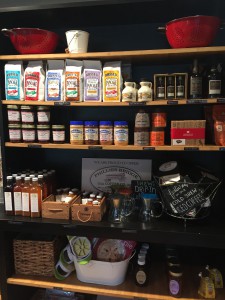
The catering business is just as dedicated to serving local, low environmental impact food as the restaurant. Kazan and his team prepare seasonal custom menus for each venue they cater, which typically include weddings, corporate events, and banquets. According to Hogan, they are already set to cater nearly 30 weddings in 2017.
The Main Course’s popularity can be accredited to its commitment to cultivating a more intimate relationship between people and the food they eat. The restaurant values open communication and transparency as necessary elements of every step of food production, whether that means maintaining a dialogue with each purveyor or visiting the farms for a first-hand look at where their ingredients are coming from. By supporting local farmers and providing consumers with the confidence that they are eating in a more sustainable way, The Main Course creates a unique foodie environment where people can enjoy a delicious, locally sourced meal and feel more connected to the agricultural communities that sustain the Hudson Valley. As Hogan beautifully summed it up during our conversation, with all of the negative environmental and social impacts that stem from the industrialization of agriculture, eating local is simply “the right thing to do.”
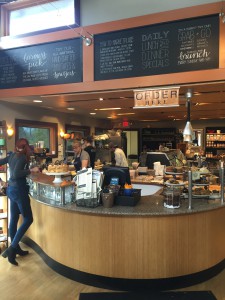
For my independent field trip, I visited Sprout Creek Farm in Dutchess County. Sprout Creek is a working farm that encompasses 200 acres and raises free-range cows, sheep, goats, free-range turkeys, guinea fowl, chickens, and pigs. When I visited with my friends, however, we mostly focused on the goats as there were about 40 recently born goats penned up together, waiting to be pet. Upon arrival, we thought we might have reached the wrong place. Nobody was in sight; animal pens and the occasional passing chicken were all we could see. After wandering around for a while, a woman walked out of one of the barn doors with her arms full of farm tools, pointed to an animal pen across the way, and said “Feel free to go inside and pet the little ones!” Nothing more needed to be said. We let ourselves into the pen and played with the baby goats for at least 45 minutes. They’d try to climb up on us and eat our clothing and hair, and my friend ended up getting a little trampled by them, but it was great! I even took a selfie with one of them as we have been instructed to do for this class. After the goats, we went into a separate barn to say hello to the cows, and then went over to the pig pens to take a look.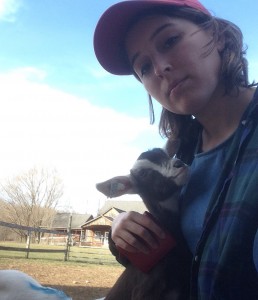
We didn’t get a chance to really speak with the farmers there, as they seemed very preoccupied. However, I loved the place so much that I did a lot of research on it upon my return home. The farm has very clever business practices, expanding beyond the realms of animal farming. Sprout Creek is a market, selling cheese, farm-produced meats, local milk, eggs, vegetables, crafts, and gifts. It is too an educational center, offering programs for children and young adults to get hands on experience with agriculture in the Hudson Valley and learn about their personal relationships with food. The farm too hosts Sunday brunch once a month, in which they serve an elaborate meal using their own freshly made and home grown food.
After researching, I realized that the fact that my friends and I were allowed to just let ourselves into the baby goat pen is also a big part of their business strategy. I followed their Instagram after visiting, and on it they constantly are posting pictures of newly-born animals and telling their followers to come to the farm to pet them and play with them. That’s why my friends and I originally went, because we were told by another friend of mine that there were baby goats there to pet. After visiting to pet them, I followed them on Instagram, am planning on going to one of their Sunday brunches, buy their cheese and sometimes other food when I can, and have promoted the farm and its baby goat petting to several other Vassar students. It’s clear that Sprout Creek Farm, despite its relatively small size, is making local, small-scale farming a prosperous and popular business. My friends and I completely bought into their whole pitch.
I had the great pleasure of spending the Sunday after Founder’s Day touring the grounds of the Millbrook Vineyards and Winery. Tucked away in rural Millbrook, Dutchess County, Millbrook Vineyards and Winery provides a beautiful escape into the comparatively unknown wine country of the Hudson River Valley. I’ve never associated the Hudson Valley with wine. Images of family farms, particularly apple orchards, dominante my perspective of agriculture in the Hudson Valley. Although different, I believe the Millbrook Vineyards and Winery situates nicely within this category of experiential, boutique agriculture.
Although I am senior, the idea of visiting a vineyard in the Hudson Valley had never occurred to me until confronting ideas of local agriculture in our ENST course. Dutchess Wine Trail signs along Route 44 have consistently reminded me of the presence of vineyards in the area, but they never succeeded in garnering significant interest among myself and friends. In fact, they generally only succeeded in generating ridicule or disbelief. Only after my recent visit to Millbrook am I aware of just how wrong I had been to dismiss the Hudson Valley wine scene so quickly these past four years.
Although located only 30 minutes from Vassar’s campus, Millbrook’s Vineyard is both remote and stunning. Millbrook’s Vineyard and Winery is accessible by means of a gravel road that leads directly through the 130-acre site. Just the drive to the entrance was enough to make me rethink my unknowledgeable, preconceived notions of what a Hudson Valley vineyard might entail.
The Millbrook Vineyard distinguishes itself from typical produce, livestock farms in an essential way. Growing grapes and producing wine is a textbook example of value-added agriculture. Wine production typifies the amenity economy. Millbrook is a place to be experienced and enjoyed. Visitors to Millbrook consume much more than wine. They consume place in the form of the idyllic vineyard and wine. Millbrook is something to be experienced. Minutes into my tour it was clear that discussing agriculture or grape cultivation would not be the focus. Wine production and consumption, rather, is at the heart of Millbrook’s mission. Upon discovering the background of Millbrook’s founder, John Dyson, this came as no surprise. Dyson formerly served as the Commissioner of the New York State Department of Commerce. In fact, Dyson is the creator of the ubiquitous “I ♥ NY” campaign. Tourism drives Millbrook.
By no means do I intend to condemn Millbrook’s push for agritourism. Millbrook has tapped into the market for Hudson Valley experiential agriculture. This is not at all dissimilar to pick-your-own orchards. To this goal, Millbrook succeeds. My trip to Millbrook was wonderful and I recommend it to all. I spent several hours on site. My visit began with a tasting of six varieties of wine produced on site. Although the samples were predominantly white wines, I was pleased with the variety of wines produced and offered. I was then given a twenty minute tour of the wine production process. This included trips to the bottling and barrel rooms. My favorite portion of the visit, though, was the walking trail through the property. This provided an up close view of the vines and wonderful views of the property.
Millbrook deserves a visit from Hudson Valley residents. Ask me, I’d go again.